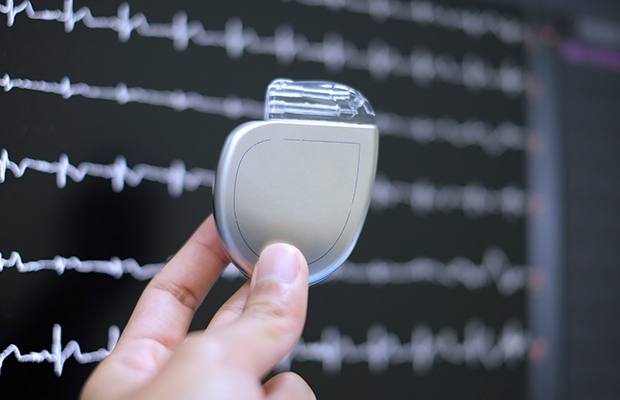
Adjusting to life with an ICD
We share an expert’s tips for living with an ICD, plus three inspiring stories on adjusting to inappropriate ICD shocks.


Dr Anne-Marie Doyle is a consultant clinical psychologist at the Royal Brompton Hospital in London. She helps people who have heart conditions come to terms with the emotional challenges of living with an ICD, supporting them to live life the way they want to.
Remember difficult feelings are normal
Dr Doyle says it helps to recognise that having difficult feelings after getting an ICD fitted is part of a normal adjustment process. “A diagnosis of a heart condition, having a cardiac arrest or a dangerous heart rhythm – these all understandably cause anxiety,” she says. “So the first thing is for you to recognise that your anxiety is a normal, healthy response to what has happened.
- Get more information about coping with anxiety when you have a heart condition
Want to get fit and healthy?
Sign up to our fortnightly Heart Matters newsletter to receive healthy recipes, new activity ideas, and expert tips for managing your health. Joining is free and takes two minutes.
I’d like to sign upAcknowledge how your life has changed
Dr Doyle says it can take time to adjust to life with an ICD. “There is a loss of the life you had before, so you have to allow yourself to feel sad and upset. It’s like a grieving process. You might have to let go of some activities. But you can find new things you can do. Recognise what you can do, think about your strengths and how to use them in a way that’s meaningful to you.”
Get the right information
As you adjust, as you get more information about your condition and about the ICD, that distress tends to lessen. “Information is very empowering and gives us a sense of control. Some people want more information about their ICD, and some want less, so it’s about finding what’s right for you. No question is silly. Make a list of your questions so you can ask the team looking after you.”
- Find out more information about how an ICD works
Dealing with inappropriate ICD shocks

An ICD can give people more freedom to go out and live their lives. But Dr Doyle says that this comes with the challenge of knowing your ICD may deliver an inappropriate shock.
“It’s certainly not pleasant and can be a frightening experience. It can take a few days, weeks, or months to feel calm or comfortable again. Remember that is a normal response. So really look after yourself following a shock, and recognise there is a natural recovery process.”
It can be especially difficult if you receive an “inappropriate shock”, which means your ICD has fired when you didn’t need it. Dr Doyle says that in this case, it’s important to recognise that devices are not perfect, and the best thing to do is to get help from your pacing clinic to work out what went wrong.
“If you think about medicines, they have benefits and side effects. And an ICD has benefits but it has drawbacks too, and so thinking about it like that can help.
4 tips for managing difficult thoughts
It’s normal to feel anxious about your ICD. But there are things you can do to manage your feelings, says Dr Anne-Marie Doyle. Here are four things you can do if you find yourself worrying.

1. Practise mindfulness
“This means we notice thoughts come in, and then they will pass by and new thoughts come in. You can think about it as clouds in the sky or leaves in a stream. Mindfulness helps us to be observers of the negative thoughts and not get caught up in them,” says Dr Doyle.
Learn more about how mindfulness is helpful for people with heart conditions
2. Write down your worries
"You can do this during a dedicated ‘worry time’, and the rest of the time you get on with your day.”
3. Distract yourself
Listening to music, doing some gardening, or watching something light-hearted and cheerful can help distract you from negative thoughts.
4. Try talking therapy
This can be particularly helpful if you have had a traumatic experience. Dr Doyle says: “There are therapies that can help you modify the memory, so it doesn’t bring back the upsetting feelings.”
Ask your GP to refer you for talking therapy, or if you live in England, you can refer yourself to a psychological therapy service in your area.
Real life stories
Three inspiring people share what it’s like to live with an ICD, and how they cope with inappropriate shocks.
 |
Building confidence after an ICD shock “Getting used to the ICD took quite a bit of doing. I felt anxious at first.” Read Elizabeth's story |
 |
Learning to see the positives
“It does feel like I’ve had some special enhancement to make me more robust.” Read Becky's story |
 |
Connecting with others like me “I joined a sudden cardiac arrest survivors’ group so I could have other people to talk to.” Read Mike's story |
How the BHF is helping
ICDs can save lives, but they’re not perfect. They can deliver electric shocks when they are not needed – which can be painful and sometimes harmful, or they may not always go off when they are needed, because they are not as good at detecting slow (rather than fast) life-threatening rhythms.
We’re funding Dr Zachary Whinnett’s team at Imperial College London to develop and test a new way that could help ICDs to better detect slower life-threatening rhythms, while reducing unnecessary shocks.
Our ICD quick guide booklet has lots of information for people who are about to have, or have already had, an implantable cardioverter defibrillator (ICD) implanted.
Published 25 February 2022
What to read next...
How can I stop worrying about my health?


